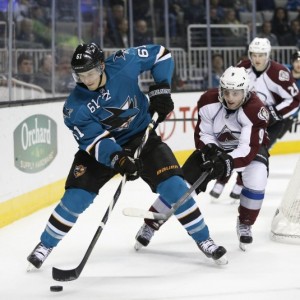It is certainly understandable when fans and experts around the NHL question the abilities of San Jose Sharks defenseman Justin Braun. For those on the east coast who don’t stay up past midnight to watch west coast games, it is easy to make the assumption that the 28-year-old Braun is simply riding the coattails of the his defense partner Marc-Edouard Vlasic. After all, Vlasic was the defensive rock for Team Canada in the 2014 Olympics. However, the lesser known Braun is a tremendous defenseman in his own right.
During the 2013-14 season in which Vlasic played for Canada, Braun likewise should have been on Team USA. That is how good No. 61 was that season and continues to be since for the Sharks. While Braun has played most of his NHL minutes alongside Vlasic, the second half of the 2013-14 season he spent largely paired with the aging and declining Brad Stuart. Overall in 2013-14, Braun sported a 54.1 Corsi-for percentage at even strength. Sure enough his possession numbers were better alongside Vlasic (every defenseman is better with No. 44) but Braun carried Stuart on the second pairing while the third pair of Dan Boyle and Matt Irwin struggled. Without Braun, Stuart’s Corsi-for was at just 49.7. With Braun it increased to 53.1.
Braun doesn’t get the accolades that Vlasic does for his defensive play primarily because he wasn’t likewise rewarded with an Olympic appearance. Before Vlasic played for Canada, he was one of the most underrated defenseman in the NHL, a description very much currently fitting for Braun. When it comes to stick positioning, skating and battle level along the boards in the defensive zone, Braun has been second best on the Sharks behind Vlasic every season. He is adept at starting breakouts and is comfortable skating the puck out of the zone on his own when no pass is available. Unlike the offensive juggernaut and power play shooter in Brent Burns, Braun doesn’t often show up in the highlights. However, that doesn’t mean he isn’t a huge part of the team.
Defensively Dominant

Of all NHL defensemen who have skated over 3,000 even-strength minutes over the past four seasons, Braun ranks 19th in the league in goals against per 60 minutes at 1.95. That is a number better than guys like Ryan McDonagh, Shea Weber and Duncan Keith. While Braun’s offensive influence isn’t as impressive, his goals-for percentage over that time frame of 52.8 is still 39th among defensemen. And remember Braun is putting forth these kinds of numbers playing against the opponent’s top lines night after night. Braun’s underrated skating ability allows him to stay stride-for-stride with the best forwards in the world. He reads the game tremendously well and is able to break up plays night after night.
With Braun having been sidelined the past two games this season the Sharks have certainly missed him. Out of 176 defensemen who have played over 200 five-on-five minutes this season, Braun ranks 28th in the league with a 60% goals-for percentage. That mark leads the Sharks, higher than Vlasic’s 58.1. Braun’s Corsi-for percentage may be below average at 49.0 and he has had some relatively good luck with a 102.6 PDO but his two-way skill set is a huge benefit in neutralizing the opposing team’s offensive attack. Without Braun in the lineup earlier this week the Sharks were dominated at even strength in a 5-2 loss to the Blackhawks. Against a fast Chicago team San Jose desperately missed No. 61’s ability to stay with elite skating forwards like Patrick Kane and Jonathan Toews.
If you don’t watch the Sharks on a regular basis, Braun isn’t going to leave an impression. There are no highlight reel goals or huge hits from him on YouTube, but in his role, having his name not frequently called by play-by-play announcers is a good thing. Not to mention 20-25 even strength points while playing a shut-down defensive role is far from shabby. Braun’s 21 five-aside points last year were 44th in the league among defenseman, his current six points have him tied for 43rd so far this season.